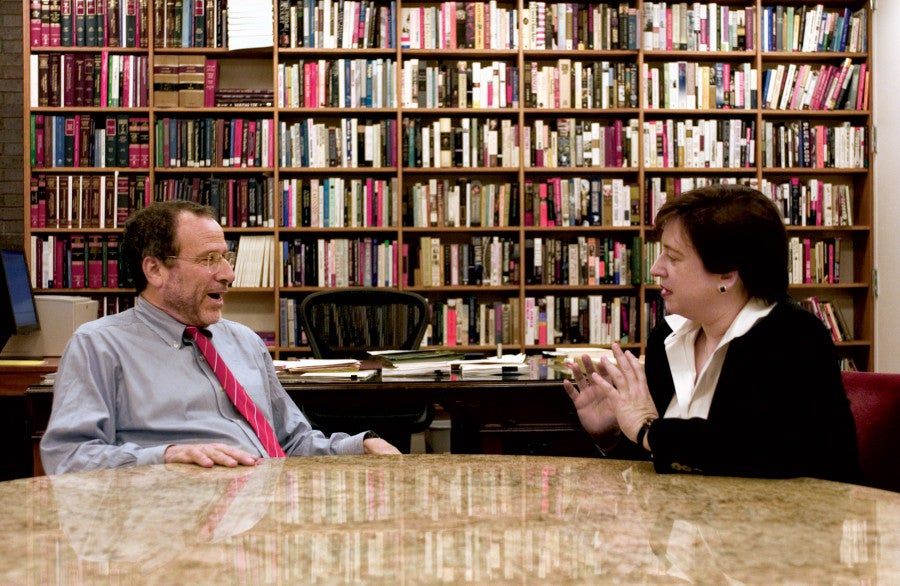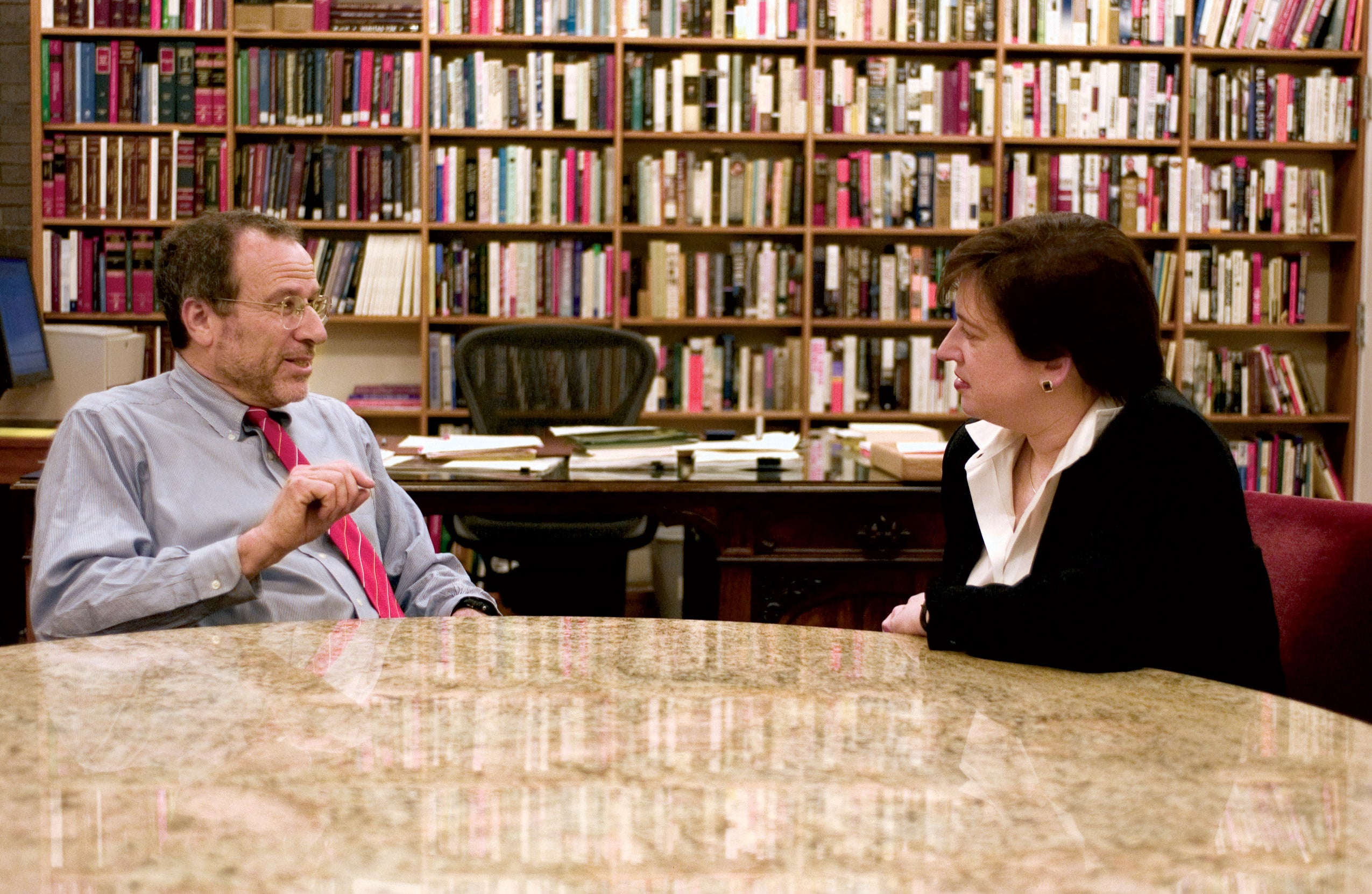Thirty years ago the U.S. Supreme Court said no. Two scholars tell us why it’s still not settled.
After columnist Robert Novak published leaked information in July 2003 revealing that Valerie Plame, the wife of a prominent critic of the Bush administration, was a CIA operative, a special prosecutor launched an investigation to determine who was responsible for the leak. When journalists were subpoenaed in federal court, they claimed they were shielded from testifying about confidential sources by the so-called “reporter’s privilege.” They did so despite the fact that in 1972, in Branzburg v. Hayes, the Supreme Court held that no such privilege is available under the First Amendment. In fact, since Branzburg, reporters under subpoena have continued to assert the privilege, and many federal courts and more than 30 states still recognize it.
How did this happen? Should the Supreme Court end the confusion by either reiterating Branzburg’s holding or recognizing a privilege? Should Congress jump in? The Bulletin put these questions to Frederick Schauer ’72, who is the Frank Stanton Professor of the First Amendment at the John F. Kennedy School of Government and a frequent teacher at HLS, and Dean Elena Kagan ’86, who teaches constitutional law and encountered the reporter’s privilege in private practice. The discussion was moderated by Robb London.
Professor Frederick Schauer: We have to start with Branzburg v. Hayes. The 5-4 majority opinion said pretty plainly there is not a privilege. That is, the First Amendment does not command that there be a reporter’s privilege. The Supreme Court slightly, but only slightly, qualified that by saying, “Of course, we do not mean to say that when there is no legitimate need for the information, and a subpoena is being used solely for harassment purposes, that the First Amendment does not come into play.”
Justice Powell, who was part of the five, issued his own concurring opinion, saying, in effect, maybe, in order to determine that there’s not harassment, there ought to be an investigation in every case to determine whether there is actual need for the information. We don’t know what he meant by that. One plausible argument is only that there ought to be an examination in every case to make sure it’s not harassment. But the other understanding of it is that it requires a determination of necessity in every case.
Picking up on that fragment in Powell’s concurring opinion, lawyers for reporters have had remarkable success convincing a large number of state and federal courts that there needs to be this case-by-case inquiry into necessity, and the Supreme Court has never revisited the issue since Branzburg.
Dean Elena Kagan: When I was a lawyer, in my first job after clerking, I worked for Williams & Connolly, and we represented The Washington Post and other news outlets. And the Post reporters often found themselves subpoenaed. And we would walk in with this boilerplate motion to quash these subpoenas based entirely on Powell’s concurring opinion, and it really just hung on this very slender thread. Former Washington Post editor Ben Bradlee was once quoted as saying that there’s a privilege whether or not the Supreme Court says there is. And that’s essentially what we went into court saying. And what was shocking is that sometimes we won notwithstanding that there wasn’t a whole lot of law in these motions. The prosecutors would back down often after we convinced them that the reporter didn’t know anything or wouldn’t say anything particularly useful. Or the judge would rule for us on the ground that there wasn’t any necessity for the reporter’s testimony. And the client–the reporter–never, ever ended up in jail.
Robb London: Isn’t something like this what happened with Tim Russert in the Valerie Plame situation–the prosecutor backed off?
Schauer: Yes, and it has happened in a number of different cases. The higher visibility the reporter, or the higher visibility the publication, the more likely it is to happen. Prosecutors don’t want to be seen as attacking the press, because in large part the people who write about attacks on the press are the press. We shouldn’t forget the old slogan, “Never argue with a fellow who buys ink by the barrel.”
Kagan: Quite right. And that’s part of what allows media lawyers and their clients to think and talk as if Branzburg had come out the other way.
Schauer: In fact, the press may not want to take the issue back to the Supreme Court, because the current understanding, in a large number of lower courts, and in a large number of legislatures, about what Branzburg means, or about whether there should be a privilege as a matter of policy, is probably much more press-favorable than what the Supreme Court of the United States in 2005 or 2006 would say if asked the question again.
London: Will the Court now look at the question again?
Schauer: It’s a touchy issue for the Court. Even justices who, in their hearts, would agree with the majority in Branzburg and want to reinforce it recognize that the Court itself has limited political capital. Taking on the institutional press is never good for the Court’s own political capital, its own reputation.
Kagan: It’s hard to know whether the Court will re-examine the issue. All these high-profile cases may put pressure on the justices to do so. But one reason the Court may not want to rule again in this area is that the status quo isn’t so bad, really. It’s hard to think of important prosecutions that have not gone forward because reporters have refused to give information. On the other hand, it’s hard to make the argument that freedom of the press has been terribly infringed by the legal regime that’s been set up. So it may be that the Supreme Court looks at the status quo and says: “Nothing seems terribly wrong with this. People are ignoring a little bit what we said, but it seems to have results that are not too bad, from either perspective.”
London: Sen. Christopher Dodd has proposed a bill that would essentially codify Justice Powell’s concurrence in Branzburg and put the burden on the prosecutor to show that the subpoena is the only way of getting the reporter’s information, and that it isn’t for purposes of harassment. Does the Dodd bill have any chance of being passed in its present form?

Schauer: I think if it is passed, it will be passed in somewhat different form than this. I think it is plausible that Congress might be sympathetic to recognizing some sort of a privilege, and might be sympathetic to a bill that puts the burden on the prosecutor to show why the subpoena is necessary and isn’t meant to harass the reporter. I think the area of vulnerability of Dodd’s bill is in who gets the privilege. This bill turns out to be not only very strong, but very broad. The institutional press would probably favor a bill that was very strong, but narrower–that is, recognizing, as 31 state statutes do, and as the existing Justice Department guidelines do, a privilege that’s held by the traditional institutional press. The mainstream press doesn’t necessarily want to see the privilege extended to bloggers and a whole range of other people who would, in the language of the bill, qualify for the privilege simply by having the intent to gather information in order to disseminate that information to the public. I think the institutional press and some of its academic supporters are going to be somewhat hesitant to favor a bill that is so broad, on the theory that the broader it is, the weaker it is likely to become in practice.
Kagan: I think, Fred, that you’ve just noted the most important question relating to the reporter’s privilege: Who’s entitled to claim it? When the privilege started, it was meant to cover the establishment press: The New York Times, The Washington Post, the major television networks. But as our media have become more diverse and more diffuse, the question of who is a member of the press, and so who gets to claim the privilege, has really come to the fore. Is the blogger entitled to claim it? And if the blogger is, then why not you, and me, and everybody else in the world? And once that happens, there’s a real problem for prosecutors seeking to obtain information. So the question of whether you can draw lines in this area, and if so how, is the real question of the privilege.
Schauer: I think there are probably two responses. There have been difficult line-drawing problems even before there were bloggers, in terms of the difference between a reporter and a writer of a book, or a writer of a more occasional publication. The 31 state statutes have drawn lines, and there haven’t been enormous problems with this. The fact that it’s a fuzzy line doesn’t mean that we can’t draw it. That’s what law does all the time.
And although there are line-drawing problems, we may want to say that there are certain institutions that, as institutions, serve in a concentrated way certain kinds of First Amendment functions. We might say that the job of checking government, the job of exposing government wrongdoing, will be largely concentrated, at least for the time being, in what we can moderately easily recognize as the institutional press. The kinds of press we had 30 years ago–the major news magazines, newspapers, radio stations, radio networks, television networks, television stations and so on–have a particular function to serve in society. And indeed, I wish more often we would draw First Amendment lines that recognize some of these institutional realities. A press-specific reporter’s privilege would be a step in this direction.
Kagan: Historically, of course, the Supreme Court really hasn’t recognized that kind of reality. It hasn’t tried to make distinctions among different kinds of press entities. And there may be strong reasons not to do this. First Amendment law is already very complicated. And if you’re asking the Court now to superimpose a whole new set of distinctions on what has already become an unbearable number of complex distinctions, you may end up feeling sorry. There are lots and lots of different kinds of press entities and other speakers. And if each one gets its own First Amendment doctrine, that might be a world we don’t want to live in.
